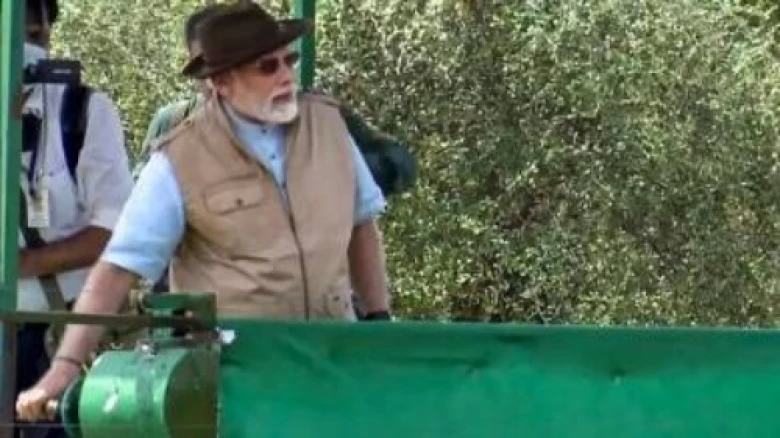Indian Air Force choppers carry eight Namibian cheetahs to their new home in Madhya Pradesh's Kuno National Park.
Digital Desk: Prime Minister Narendra Modi released cheetahs brought from Namibia this morning at Madhya Pradesh's Kuno National Park. From Gwalior Air Force Station, Indian Air Force choppers escorted the eight cheetahs imported from Namibia this morning to Kuno National Park.
The fastest land predator is being introduced into India as part of Project Cheetah, the world's first inter-continental large wild carnivore translocation project, according to a statement issued by the Prime Minister's Office (PMO) on Thursday.
Kuno National Park saw the translocation of five female and three male cheetahs. After more than 70 years, cheetahs are once again traversing Indian territory.
Watch the video of PM Modi releasing the Cheetahs:
Shivraj Singh Chouhan, the chief minister of Madhya Pradesh, remarked, "There is no better present for MP than the arrival of the cheetahs from Namibia to Kuno National Park. Reintroducing them is a historic step because they had become extinct. The largest animal incident in the past century is this one. This will significantly increase tourism in MP."
Without any congested areas, the 748 square kilometer Kuno Palpur National Park in Madhya Pradesh becomes the new home of the eight African cheetahs. The area is adjacent to the Sal forests of Koriya, now in Chhattisgarh, where the native Asiatic cheetah was possibly last seen nearly 70 years ago.
Project Cheetah: A Government's Initiative
The government claims that "Project Cheetah" is the world's first intercontinental large wild carnivore translocation project. It involves reintroducing cheetahs to India.
The National Tiger Conservation Authority (NTCA), Ministry of Environment, Forest and Climate Change (MoEF&CC), is in charge of overseeing the cheetah's reintroduction in India following the Supreme Court's directives from 2020. The NTCA is guided and directed by the committee of experts appointed by the Supreme Court.
The government claims that cheetahs would aid in the restoration of open forest and grassland ecosystems in India, which will benefit society as a whole by preserving biodiversity and enhancing ecosystem services like water security, carbon sequestration, and soil moisture conservation.
The Wildlife Trust of India started discussions in 2009 about reintroducing cheetahs to India. At a meeting with experts from across the world, government officials from India, including the Ministry of Environment, Forests, and Climate Change, and representatives of the state governments, it was decided to study prospective reintroduction sites.
Factors of the extinction of cheetahs in India
According to the research, widespread capture of cats from the wild for coursing, reward, and sport hunting, substantial habitat modification, and a resulting loss in prey base were the main causes of the cheetah's decline in India.
Three cheetahs were shot in the Sal (Shorea robusta) forests of Koriya district, Chhattisgarh state, in 1948, marking the end of the species in the wild. There were intermittent reports from the Deccan and central regions up till the mid-1970s.
The last three cheetahs to be seen in India, however, were shot by the Maharajah of the state of Koriya in 1947, said wildlife specialist Divyabhanusinh.

Leave A Comment